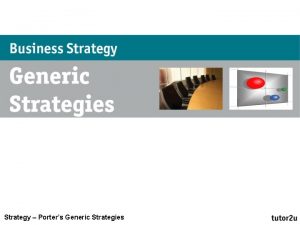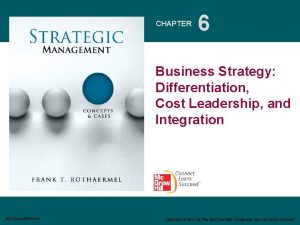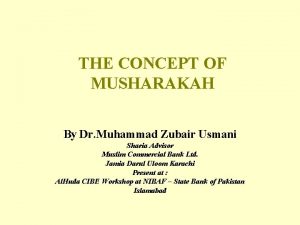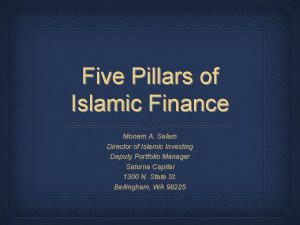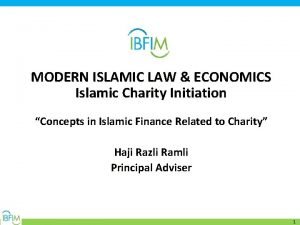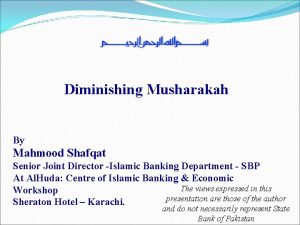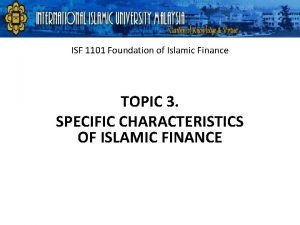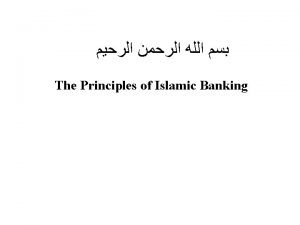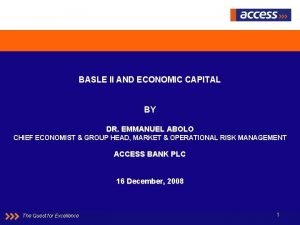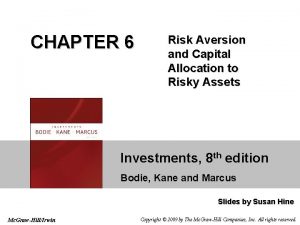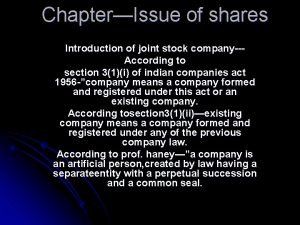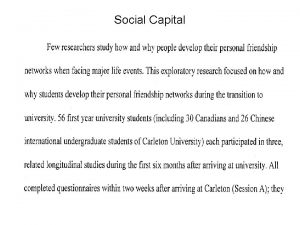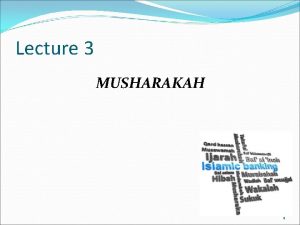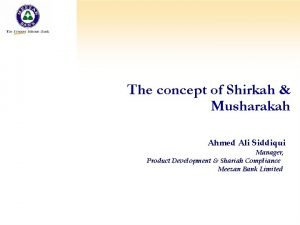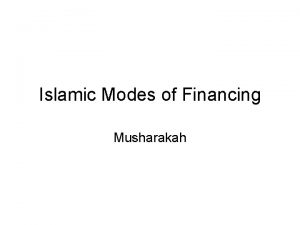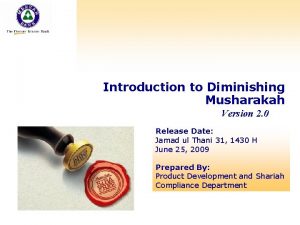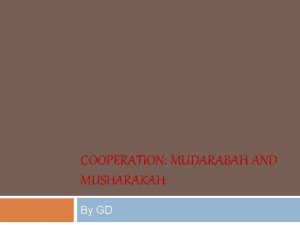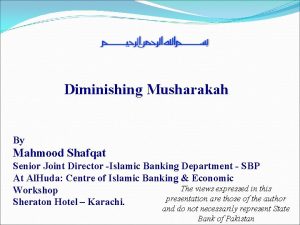TREATMENT OF CAPITAL IN MUSHARAKAH We will focus




















- Slides: 20

TREATMENT OF CAPITAL IN MUSHARAKAH

• We will focus two aspects of capital required for Musharakah establishment: 1. Whether the capital should be in liquid form or not? 2. Mixing of capital is necessary or not?

LIQUIDITY OF CAPITAL • A question commonly asked in the operation of Musharakah is whether the capital invested needs to be in liquid form or not. • The answer as to whether the contract in Musharakah can be based on commodities only or on money varies among the different schools of thought in Islam.

• Mixing of capital in Musharaka is necessary or not? • This issue can be resolved in the light of the following schools of thought:

• Imam Malik is of the view that liquidity is not a condition for the validity of Musharakah. Therefore even if a partner contributes in kind to the partnership his share can be determined on the basis of the valuation according to the prevalent market price at the date of the contract.

• However Imam Abu Hanifa and Imam Ahmad bin Hanbal do not allow capital of investment to be in kind. The reason for this restriction is as follows: • Commodities contributed by one partner will always be distinguishable from the commodities given by the other partners therefore they cannot be treated as homogenous capital.

• If in case of redistribution of share capital to the partners tracing back each partners share becomes difficult. If the share capital was in the form of commodities then redistribution cannot take place because they may have been sold at that time.

• Issue of in kind (commodities) share has been resolved by Imam Shafi by dividing commodities into two types: • Dhawat-ul-Amthal: Commodities which if destroyed can be compensated by similar commodities in quality and quantity. Examples are rice, wheat etc. • Dhawat-ul-Qeemah: Commodities that cannot be compensated by similar commodities like animals. Vehicles etc.

• Imam Shafi is of the view that commodities of the first kind may be contributed to Musharakah in the capital while the second type of commodities cannot be a part of the capital.

• In case of Dhawat-ul-Amthal redistribution of capital may take place by giving to each partner the similar commodities he had invested and earlier the commodities need to be mixed so well together that the commodity of one partner cannot be distinguished from commodities contributed by the other.

MIXING OF THE CAPITAL • According to Imam Shafi partners’ capital should be mixed so well that it cannot be discriminated and this mixing should be done before any business is conducted. Therefore, partnership will not be completely enforceable if any kind of discrimination is present in the partners’ capital.

His argument is based on the reasoning that unless both investments will be mixed the investment will remain under the ownership of the original investor and any profit or loss on trade of that investment will be entitled to the original investor only. Hence such a partnership is not possible where the investment is not mixed.

• According to Imam Abu Hanifa, Imam Malik and Imam Ahmed bin Hanbal the partnership is complete only with an agreement and the mixing of capital is not important.

• They are of the opinion that when two partners agree to form a partnership without so far mixing their capital of investment, then if one partner bought some goods for the partnership with his share of investment of Rs. 100, 000, these goods will be accepted as being owned by both partners and hence any profit or loss on sale of these goods should be shared according to the partnership agreement.

• Since in Hanafi, Maliki and Hanbali schools of thought mixing of the capital is not important therefore a very important present day issue is addressed with reference to this principle. If some companies or trading houses enter into partnership for setting up an industry to conduct business they need to open LC for importing the machinery.

• Under Shafi school of thought, the imported goods cannot become the capital of investment but will remain in the ownership of the person opening the LC. • Three schools of thought believe that partnership comes into existence at the time of agreement rather than after the capital has been mixed therefore the burden of loss will be borne by all. This has two advantages

1. In case of loss the burden of loss will not fall upon one rather will be shared by all firms of the partner

Continues. . • If the capital is provided at the time of the agreement it stays blocked for the period during which the machinery is being imported. While if the capital was not kept idle, till the actual operation could be conducted with the machinery the same capital could have been used for something else as well. • This shows that the decision of the three combined schools of thought is better equipped to handle the current import export situation.

• Imam Malik is of the view that the liquidity of capital is not a condition for the validity of musharakah and also allows capital in kind while Imam Abu Hanifa and others require capital in liquid form only. • Imam Shafi allows only Dhawat Ul Amthal commodities in capital only.

• Three schools of thought (Imam Abu Hanifa, Shafi & Hanbal) believe that partnership comes into existence at the time of agreement rather than after the capital has been mixed therefore the burden of loss will be borne by all while Imam Shafi considers the mixing of capital a pre requisite for the musharakah
 Musharakah definition
Musharakah definition Integrated cost leadership/differentiation strategy
Integrated cost leadership/differentiation strategy Business level strategy differentiation
Business level strategy differentiation Actor focus vs object focus
Actor focus vs object focus Focus on form vs focus on forms
Focus on form vs focus on forms Permanent musharakah
Permanent musharakah Features of musharakah
Features of musharakah Monem salam
Monem salam Tawarruq
Tawarruq Diminishing musharakah agreement
Diminishing musharakah agreement Merely
Merely Ib islam
Ib islam Diminishing musharakah example
Diminishing musharakah example Regulatory capital vs economic capital
Regulatory capital vs economic capital Capital allocation line vs capital market line
Capital allocation line vs capital market line What is gross working capital
What is gross working capital Regulatory capital vs economic capital
Regulatory capital vs economic capital Multinational cost of capital and capital structure
Multinational cost of capital and capital structure Difference between capital reserve and reserve capital
Difference between capital reserve and reserve capital Constant capital and variable capital
Constant capital and variable capital Difference between capital reserve and reserve capital
Difference between capital reserve and reserve capital

